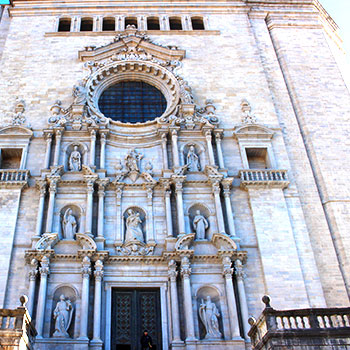Nationalism & Separatism in Catalonia Today
Spanish Language & Culture Program
Barcelona, Spain
Dates: 1/11/23 - 4/29/23

Nationalism & Separatism in Catalonia Today
OVERVIEW
CEA CAPA Partner Institution: CEA CAPA Barcelona Center
Location: Barcelona, Spain
Primary Subject Area: Political Science
Instruction in: English
Course Code: POL481BCN
Transcript Source: University of New Haven
Course Details: Level 400
Recommended Semester Credits: 3
Contact Hours: 45
Prerequisites: One 200-level course or two 100-level courses in Political Science/Comparative Politics
DESCRIPTION
The current surge of support for independence in Catalonia is profoundly altering Spanish politics, affecting the European Union, and reverberating in the international press. Whether pro-independence or not, the vast majority of Catalans assert a "right to decide" over the future relationship of the autonomous community and the Spanish state. Supporters claim that Spain should permit Catalonia to hold a referendum on separation in much the same manner as Canada and the United Kingdom did for Quebec (1995) and Scotland (2013). In contrast, the major political parties in Spain oppose a referendum, arguing that it is contrary to the Constitution and practically all the constitutions of democratic states in Europe and the world. What is more, Catalans are divided on independence. Most native Catalan speakers (about half the Catalan population) favor independence, while most native Spanish speakers (about half the Catalan population) oppose it. Amid this polarization, many have proposed a middle ground in which the constitution could be reformed in order to create a federal Spain or grant Catalonia a greater degree of self-government and fiscal autonomy. Will Catalans vote on independence? If so, will they vote to secede? Or will a compromise be found?
This course is divided into two sections. The first part begins with a brief introduction to the ethno-linguistic characteristics of the population and outlines the present status of the conflict. We will then explore the historic origins of Catalan nationalism with an emphasis on the decades since the end of dictatorship and the coming of democracy in 1975. Until recently, most "Catalanists" did not seek to secede but aimed for greater political and fiscal autonomy within Spain while promoting and defending their language and culture.
The second part of the course examines why the quest for independence gained momentum. It begins with the political crisis triggered when the Spanish Supreme Court struck down key provisions of Catalonia's Statute of Autonomy in 2010, an event that caused massive public demonstrations. We will then examine the worldwide economic crisis, which caused soaring unemployment and rising discontent among those who claimed that Catalonia unduly suffered due to acute fiscal imbalances. We will examine political, legal, and economic arguments both for and against independence and discuss the extent to which the surge of support for independence is due to the recent effects of the political and economic crises or to the long-term changes in linguistic and cultural identities. We will also examine the feasibility of an independent Catalonia within the European Union and a globalized world.
Although the course focuses on Catalonia, it addresses broad themes, engaging with theories of nationalism and exploring the relationship between democracy and secession. This course will help you reflect critically on movements for national self-determination in Europe and the world. You will reflect upon the meaning of ethnic and linguistic difference and minority rights, develop intercultural competences, and cultivate your sense of global citizenship.
This course is divided into two sections. The first part begins with a brief introduction to the ethno-linguistic characteristics of the population and outlines the present status of the conflict. We will then explore the historic origins of Catalan nationalism with an emphasis on the decades since the end of dictatorship and the coming of democracy in 1975. Until recently, most "Catalanists" did not seek to secede but aimed for greater political and fiscal autonomy within Spain while promoting and defending their language and culture.
The second part of the course examines why the quest for independence gained momentum. It begins with the political crisis triggered when the Spanish Supreme Court struck down key provisions of Catalonia's Statute of Autonomy in 2010, an event that caused massive public demonstrations. We will then examine the worldwide economic crisis, which caused soaring unemployment and rising discontent among those who claimed that Catalonia unduly suffered due to acute fiscal imbalances. We will examine political, legal, and economic arguments both for and against independence and discuss the extent to which the surge of support for independence is due to the recent effects of the political and economic crises or to the long-term changes in linguistic and cultural identities. We will also examine the feasibility of an independent Catalonia within the European Union and a globalized world.
Although the course focuses on Catalonia, it addresses broad themes, engaging with theories of nationalism and exploring the relationship between democracy and secession. This course will help you reflect critically on movements for national self-determination in Europe and the world. You will reflect upon the meaning of ethnic and linguistic difference and minority rights, develop intercultural competences, and cultivate your sense of global citizenship.








